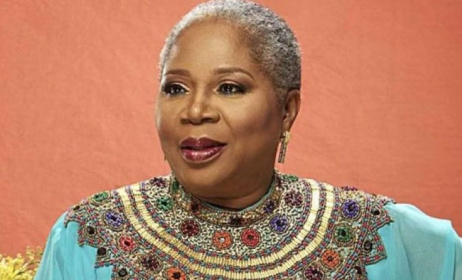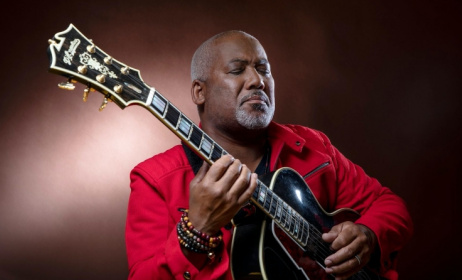Music and religion in Cameroon
By Ngbwa Jean Fabrice
In Cameroon, the religious scene is shared between many Christian churches, whose faith is based on Jesus Christ’s life. Although music is a common reality, the way it is perceived and performed in each church is noticeably different. It is a sacred, biblical practice that plays a major role during ceremonies - mostly through choirs, which are numerous. Each of them has its very own way of recruiting members, teaching them and choosing songs. This text provides an overview of some of the key features of religious music in Cameroon.
 Gospel music awards. Photo: Drimp Foundation
Gospel music awards. Photo: Drimp Foundation
Traditional churches
In the Catholic Church, music is known as liturgical singing when it follows catechism standard[i] and varies according to institutions and locations. For example, in convents and seminars, singing is a community obligation during services, eucharistic celebrations and community meetings[ii]. On the other hand, in parishes, music is dedicated to various types of choirs. Gregorian and classic chants are to be heard in cathedrals, polyphonic and folk styles in urban parishes, and strictly folk choirs in rural areas. Depending on the choir, songs are selected according to liturgic readings and to the course of the mass.
Classic choirs mostly use the following songbooks: The Most Famous Church Chants, The Rainbow and The Psalter. Catholic choir members are recruited on a volunteer basis, upon invitation from another member or upon request from a clergy leader.
What makes the difference between amateur and professional choirs is the introduction to music theory and harmony, and knowledge of instruments. So far, professional Catholic Church choirs are the most successful, thanks to the Madrigal Choir which was created in 1972 and which introduced polyphonic singing to Cameroon[iii]. Many talented choir conductors then established themselves, such as Ntonga, Hubert Minkoulou and Gaby Moudio. The Catholic choirs that truly distinguished themselves include the Great Classic Choir from the Cathedral Our Lady of Victories in Yaoundé, and the Voice of Cenacle, which combined the keyboard with local rhythms. Besides, the rise of Catholic folk choirs was boosted by the Ecclesia Synod in Africa in 1995, which promoted cultural integration within the church. The very same church that in the past had white missionaries such has Bishop René Graffin call balafons ‘evil’ instruments.[iv]
Christians accentuated this complex by harshly criticizing Ewondo songs and praising Gregorian chants[v]. Clergymen Léon Messi[vi] and Bishop Xavier Amara remarkably fought for the conservation of Southern and Central traditional music. New music genres emerged in churches: ekang, essani, olack, n’gneg, osila (initiatory types of music) performed with balafons and percussions such as drums (Mbè), tcheker (gnas), and tom-toms (Nkù). So far emerging Ewondo choirs are Marie-Reine of the Apostles of Mvolyé don’t, whose repertoire is composed by the clergy and choir masters.
Furthermore, the Presbyterian Church of Cameroon incorporates music into worship[vii]. It includes associations called the Children Association (Nsamba bongo), the Evangelical Protestant Action Youth that the Women Association (Samba binga), which masters the art of folk rhythms, tom-toms and drums[viii] ; as well as the Men Association. The two last associations specialize in praise and worship carols, thanksgiving, supplication and enlightment, according to the different stages of the service. Traditionally, classical and folk choirs sing two carols during the service.
Classical choirs are the most talented when it comes to singing masterpieces by Handel or Mozart while accompanied by a keyboard or a brass band[ix]. A good example is the Messianic Choir of Mendong. Folk choirs are characterized by a strong desire to value local genres. This is the case with Quram Holy Spirit with its ‘back to the roots’ concept[x]. The Presbyterian community find their carols in songbooks such as On the Wings of Faith, To You be the Glory, Bulu Carols and Hymn and Praises. In Presbyterian parishes of Mendong-Laodicée and Qumrân Holy Spirit, all new recruits have to go through an observation period of six to 12 months, during which they also learn music theory.
Pentecostal movements
Pentecostal religious movements have been on the rise for a while in Cameroon. They brought along a new genre: gospel music. Each and every congregation choir has its very own style, whether it is rock n roll, RnB, negro spiritual, rumba, reggae, coupé-décalé or local rhythms. The sermon is always strictly inspired by the Bible and the repertoire includes both original songs and hymns.
The rise of gospel music is related to the advent of structures such as the Drimp Foundation, which is investing in local gospel music[xi]. In 2014, the city of Yaoundé welcomed the 4th edition of the Gospel Music Awards, with an audience of 6500 people. The most recent award winners are Golden Voices and Joy Spirit Singers.
Other religious movements
The Bwiti movement is completely different from traditional churches or Pentecostal movements. It’s music is a unique genre that is performed with special instruments. In the Bwiti tradition, sacred music is a duty for the whole community[xii], which means that the proceedings of the service are closely connected with the process of learning to sing and play instruments[xiii]. One of the instruments is the obaka, a small dry tree trunk that is placed behind the altar and held by two wooden tripods. It is played exactly as drums to accompany a harp. The sounds of sticks hitting the obaka evokes the birth of the Creator. The ngomo, which is an intercession instrument, is an eight-string harp that represents the strength of the Holy Spirit.
Despite its rich diversity, across Cameroon and in all churches, sacred music still faces a lot of challenges, such as: recruiting new choir members, training and funding choirs, copyright issues and cultural integration. According to Dr Ngumu Pie-Claude, ‘Nowadays, we are witnessing the swift rise of a modern type of music that is pretending to be African (…) But when you take a closer look, you soon realize how empty and meaningless this new music is...” [xiv]
Religious music definitely needs to value African rhythms, especially in Pentecostal churches. Unfortunately, the quest for new sounds is putting years of tradition in the shade. The ultimate challenge is to bring in a large number of members, so some Pentecostal church choirs are on a mission to seduce people by playing and singing more ‘wordly’ music, with a twist. Nervertheless, exceptional figures such as Queen Eteme can still be a positive inspiration for devious minds.
[i] Martial Mvondo, former seminrian. Choir Master of the Classical Angelic Choir of Saint Achilles Kiwanuka of Mendong-Camp. Interview on 18 August 2014. [ii] Désiré Manga, theology student at the Saint-Apostles Congregation, Nkolbison Residence. August 8th, 2014. [iii] Félicité Bahane, «René Esso Elokan’s funeral » https://www.cameroontribune.cm, 06 August 6th , 2014. [iv] R.B Onomo Etaba, Roman Pontiffs and the spatio-temporal evolution of the Catholic Church of Cameroon from the beginings to 1991. , Upper graduate level thesis in history, University of Yaounde I, 1999-2000, PP.143-144. [v] Archives of the charity diocese departement, letter from Father Raymond spira to His Excellency Bishop Jean Zoa, Nlongkak, Yaounde, February 28th 1980. [vi] L. Messi, gleanage of the colonial era, unpublished, Yaounde, 1990, P.27. [vii] Mbeyo’o Ole Mois, church elder, choir master, Qumrân Holy Spirit Parish, Mendong Camp Sic-Yaounde, interview on July 25th, 2014. [viii] Gérault Nlate, choir master, church elder at the Presbyterian Church of Yaounde, Ntem Parish Consistory, Mendong-Yaounde. Interview on August 11th, 2014. [ix] Ibid. [x] Daniel Ezo’o, Minister at the Presbyterian Church of Cameroon, Quram Holy Spirit, Mendng-Yaounde, Interview in June 2014. [xi] www.drimpfounddation.org/gospelmusical [xii] Lebel, harpiste et initié mbwiti, Messame Ndongo-Yaoundé, entretien du 24 Août 2014. [xiii] Nathalie Mindzié, fidèle de la communauté mbwiti, initiée, Messa-Mendongo Yaoundé, 12 Août 2014. [xiv] Ngumu, Pie-Claude, Les recherches ethnographiques en Afrique centrale, le cas du Cameroun, N° 2742 extrait de recherche, pédagogie et culture, N° 65/66, Paris, 1983, PP 65-66.


































Comments
Log in or register to post comments